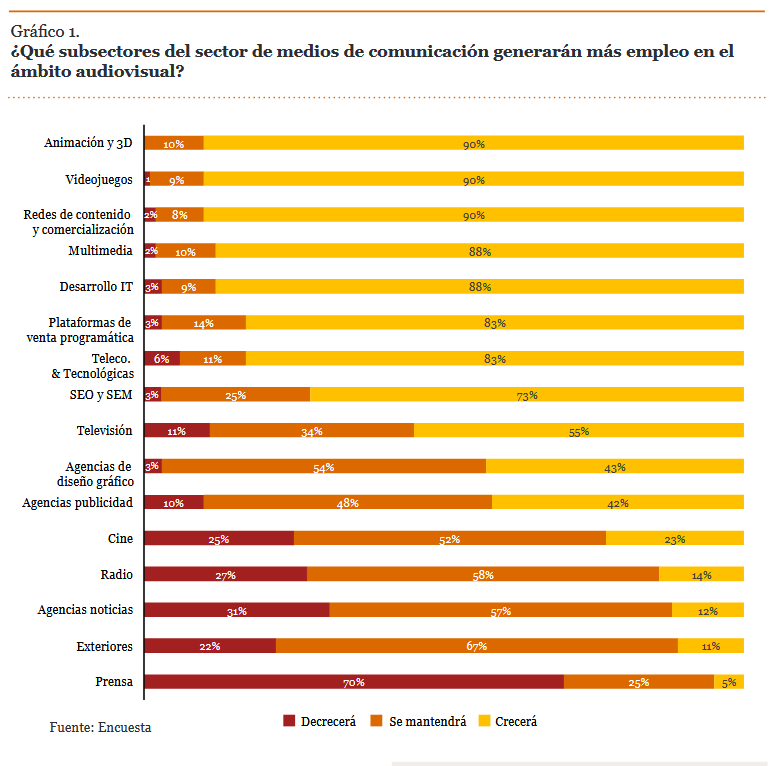In 2010, Bob Woodward, the legendary journalist at the Washington Post and a role model for millions of journalism students across the world, was given a work iPad – that was the moment that we all knew that the wind of change was blowing through the profession and that adapting to these changes was a matter of survival.
The paradigm shift in journalism had probably already happened by then, but the move by the Post was a real before-and-after moment for all journalists. The time of Dictaphones and microphones is passing and we’re moving into a period in which journalism training is taking on a different shape.
What careers are possible away from the mass media?
A range of reports on employability, careers, and job market opportunities have shown that there is a wide range of possibilities open to new graduates.
The first such report is the Active Population Survey, known as EPA, carried out by the Spanish Statistical Office, INE, in 2017. This focused on the influence of education and training on the job market. It was found that those who studied Social Sciences, Journalism and Information Science were fourth in the employability rankings, with 72.5% of them in employment and 13.67% being unemployed.
Further studies have shown how there are other types of job opportunities available to trained journalists away from traditional media. The Fundación Atresmedia and the Fundación PwC undertook just such a study on future employment prospects, finding that content creation will in the future generate more jobs than traditional areas such as radio, the press or news agencies.
The fact is that the communication business in the digital age is evolving and adapting at the same pace as new changes are occurring across society.
Jeff Jarvis, a leading analyst and commentator on the world of journalism, told us that “these are times in which journalism has to be redesigned, and the business model has to be changed”, and the volume model of information has to be changed for one in which we see the “real value of information”
Key figures and areas in this redesign of journalism will be:
• Corporate communications offices
• Community Managers
• Events and protocol managers
• Digital communication offices
• Content editors
• Communication consultants
• Scriptwriters and editors
• SEO specialists
How can I use my degree in journalism in these new areas?
Many CEU graduates have undertaken successful careers in areas away from media organizations.
For example, Fátima Navarro, Communications Director at the Fundación Universitas Miguel Hernández (UMH) in Elche, says that her degree in journalism has been essential “to develop critical thinking and analytical skills which I can use in the situations I face every day.” Read an interview with CEU Journalism graduate Fátima Navarro: from lectures in journalism to Communications Director.
Silvia Aguilar, head of the Communications and Institutional Relations Department for El Corte Inglés in Alicante and Elche, thinks that studying for a degree in journalism gave her great insight into “what communication is and what it means in all its forms and areas of application.” Read an interview with CEU Journalism graduate Silvia Aguilar: journalists have to be versatile and multi-disciplinary.

Setting up your own company is another appealing option for journalism graduates. That’s what Víctor Romero did by creating the brand VMR Comunicación. “The kind of corporate communications I offer to clients is about informing, shaping opinion and entertaining the reader,” he told us. Read an interview with the CEU Journalism graduate Víctor Romero: the entrepreneurial journalist.
Emilio Fernández’s latest creative experience involves being the director of VIDA Creative & Crazy Collective. He says that studying Journalism at CEU has helped him to “know how to manage information and give information technologies the importance they deserve.” Read an interview with the CEU Journalism graduate Emilio Fernández: the creative journalist.

And then, of course, there is the online world. Cristina Vílchez is Online Marketing Manager for Grupo Pikolinos and she knows exactly how important her degree was for her: “journalism is about telling stories and being able to capture the attention of the audience regardless of the medium.” Read an interview with the CEU Journalism graduate Cristina Vílchez: the online specialist.
Study for our Certificate in Fashion Communication
Study for a Master’s Degree in Digital Communication and Branding.













